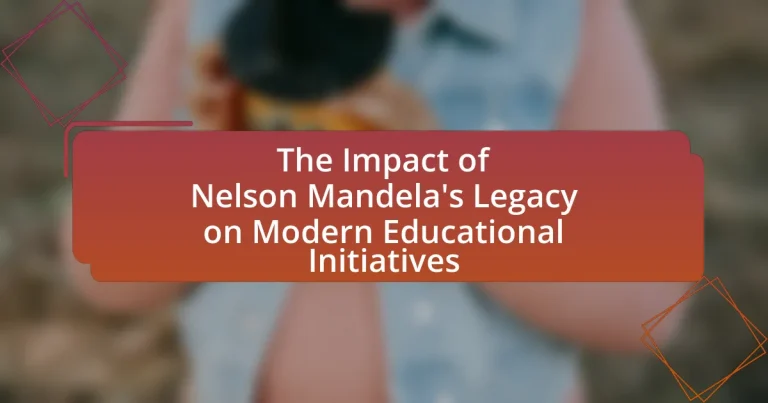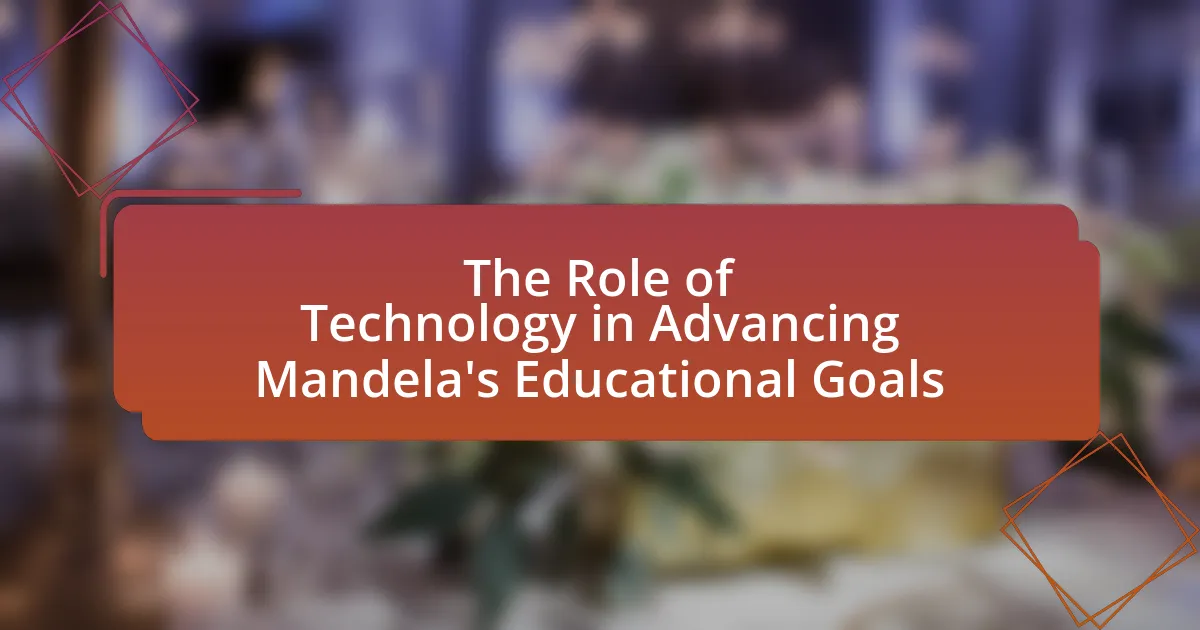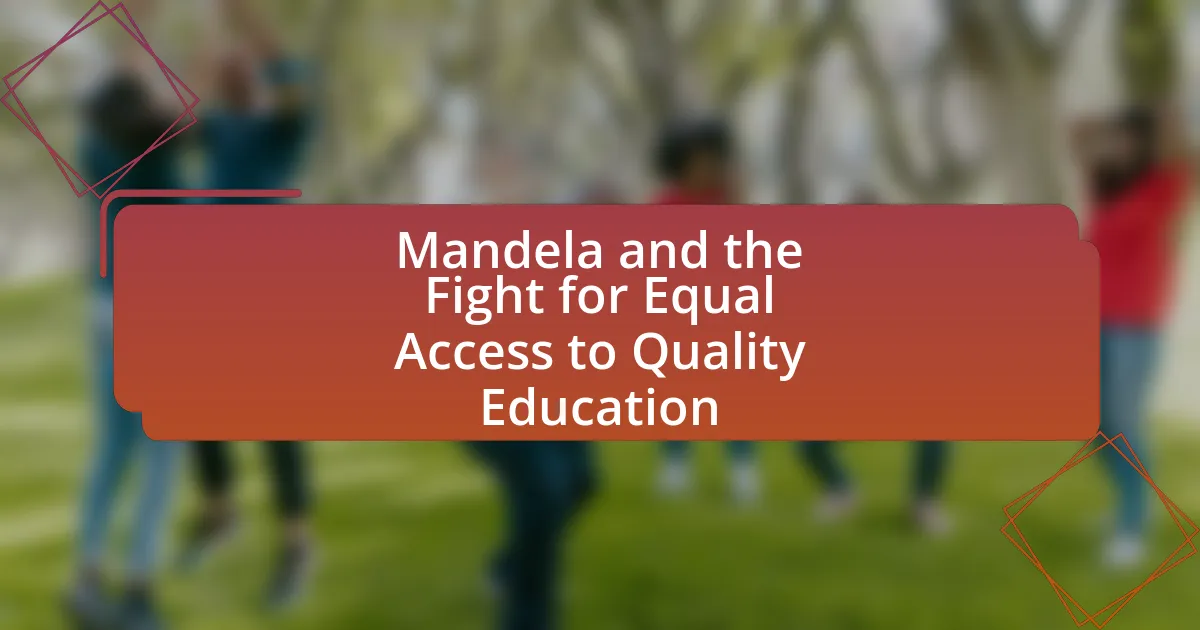The article examines the profound impact of Nelson Mandela’s legacy on modern educational initiatives, highlighting his advocacy for education as a fundamental human right and a tool for social justice. It discusses how Mandela’s experiences, particularly during apartheid and his imprisonment, shaped his views on education and influenced key policies aimed at promoting equality and accessibility in South Africa’s education system. The article also explores contemporary educational programs inspired by Mandela’s teachings, the challenges faced in embodying his legacy, and practical steps educators can take to integrate his principles into their classrooms. Overall, it underscores Mandela’s enduring influence on global educational reform and the ongoing efforts to create inclusive and equitable learning environments.
What is the impact of Nelson Mandela’s legacy on modern educational initiatives?
Nelson Mandela’s legacy significantly influences modern educational initiatives by promoting values of equality, access, and social justice in education. His advocacy for education as a fundamental human right has inspired global movements aimed at increasing educational opportunities for marginalized communities. For instance, the establishment of the Nelson Mandela Foundation has led to various educational programs that focus on leadership development and social responsibility, emphasizing Mandela’s belief that education is the most powerful weapon for changing the world. Additionally, initiatives like the Mandela Day campaign encourage individuals and organizations to contribute to educational projects, reinforcing the importance of community involvement in fostering educational equity.
How did Nelson Mandela’s experiences shape his views on education?
Nelson Mandela’s experiences profoundly shaped his views on education, emphasizing its role as a powerful tool for social change and personal empowerment. His early exposure to the injustices of apartheid highlighted the disparities in educational access, leading him to advocate for equal educational opportunities for all South Africans. Mandela believed that education was essential for overcoming oppression, as evidenced by his statement, “Education is the most powerful weapon which you can use to change the world.” His own educational journey, including his studies at the University of Fort Hare and his legal training, reinforced his conviction that education fosters critical thinking and leadership. Mandela’s commitment to education is reflected in his post-presidency efforts, such as the establishment of the Nelson Mandela Foundation, which promotes education as a means to combat poverty and inequality.
What key events in Mandela’s life influenced his educational philosophy?
Key events in Nelson Mandela’s life that influenced his educational philosophy include his experiences at the University of Fort Hare, where he was exposed to diverse ideas and political activism, and his time in prison, which deepened his understanding of the importance of education as a tool for liberation. At Fort Hare, Mandela encountered a curriculum that emphasized critical thinking and social justice, shaping his belief in education as a means to empower individuals and communities. Additionally, during his 27 years of imprisonment, Mandela recognized the transformative power of education, advocating for equal access to quality education for all South Africans, which he later emphasized in his post-presidency initiatives. These experiences collectively reinforced his commitment to education as a fundamental human right and a catalyst for social change.
How did Mandela’s imprisonment affect his perspective on education?
Mandela’s imprisonment profoundly shaped his perspective on education, leading him to view it as a crucial tool for liberation and social change. During his 27 years in prison, he recognized that education empowers individuals and communities, fostering critical thinking and resilience against oppression. Mandela famously stated, “Education is the most powerful weapon which you can use to change the world,” highlighting his belief that access to quality education is essential for achieving equality and justice. This conviction influenced his post-release efforts to promote educational initiatives in South Africa, emphasizing the need for inclusive and equitable education systems to uplift marginalized communities.
Why is Nelson Mandela considered a symbol of educational reform?
Nelson Mandela is considered a symbol of educational reform due to his unwavering commitment to education as a fundamental human right and a tool for social change. Mandela famously stated, “Education is the most powerful weapon which you can use to change the world,” highlighting his belief in education’s transformative power. His efforts in post-apartheid South Africa led to significant reforms, including the establishment of policies aimed at increasing access to quality education for all, particularly for marginalized communities. Under his leadership, the South African government prioritized education, resulting in increased enrollment rates and the introduction of new curricula that emphasized inclusivity and equality. These initiatives laid the groundwork for ongoing educational reforms, making Mandela a lasting symbol of the fight for equitable education.
What specific educational policies did Mandela advocate for during his presidency?
Nelson Mandela advocated for policies aimed at transforming South Africa’s education system to promote equality and accessibility. He emphasized the need for a unified education system that would eliminate the disparities created by apartheid, focusing on improving the quality of education for all, particularly for historically disadvantaged communities. Under his presidency, the introduction of the National Education Policy Act in 1996 aimed to provide free and compulsory education for children, and the establishment of the South African Qualifications Authority sought to standardize educational qualifications across the country. These initiatives were grounded in the belief that education is a fundamental human right and essential for fostering social cohesion and economic development.
How did Mandela’s vision for education address social inequalities?
Mandela’s vision for education aimed to eliminate social inequalities by promoting equal access to quality education for all South Africans, regardless of their background. He believed that education is a powerful tool for social change and advocated for a system that would dismantle the apartheid-era disparities in educational resources and opportunities. Mandela’s government implemented policies that focused on improving infrastructure in underprivileged areas, increasing funding for schools in marginalized communities, and fostering inclusive curricula that reflect the diverse history and culture of South Africa. These initiatives were designed to empower disadvantaged groups, thereby addressing the systemic inequalities that had long persisted in the education system.
What are the core principles of Mandela’s educational legacy?
The core principles of Mandela’s educational legacy include the belief that education is a powerful tool for social change, the importance of accessibility to quality education for all, and the promotion of critical thinking and lifelong learning. Mandela emphasized that education should empower individuals to challenge injustices and contribute positively to society. He famously stated, “Education is the most powerful weapon which you can use to change the world,” highlighting his conviction that education can transform lives and communities. His legacy continues to inspire modern educational initiatives that aim to create inclusive and equitable learning environments globally.
How do these principles promote inclusivity in education?
Nelson Mandela’s principles promote inclusivity in education by advocating for equal access to quality education for all individuals, regardless of their background. These principles emphasize the importance of diversity, respect, and understanding, which create an environment where every student feels valued and supported. For instance, Mandela’s focus on dismantling apartheid education systems laid the groundwork for policies that aim to eliminate barriers to education, such as socioeconomic status and race. This commitment is reflected in initiatives that prioritize marginalized communities, ensuring that educational resources and opportunities are equitably distributed.
What role does critical thinking play in Mandela’s educational framework?
Critical thinking is central to Mandela’s educational framework, emphasizing the development of analytical skills and independent thought among learners. Mandela believed that education should empower individuals to question societal norms and engage critically with their environment, fostering a sense of responsibility and active citizenship. His approach is evident in his advocacy for a holistic education that includes not only academic knowledge but also moral and ethical reasoning, which is essential for addressing social injustices. This framework aligns with his vision of education as a tool for liberation and transformation, as articulated in his speeches and writings, where he stated that “education is the most powerful weapon which you can use to change the world.”
How has Mandela’s legacy influenced contemporary educational initiatives globally?
Mandela’s legacy has significantly influenced contemporary educational initiatives globally by promoting values of equality, access to education, and social justice. His emphasis on education as a powerful tool for personal and societal transformation has inspired numerous programs aimed at increasing educational opportunities for marginalized communities. For instance, the Nelson Mandela Foundation supports various educational projects that focus on improving literacy and access to quality education in underprivileged areas, reflecting Mandela’s belief that education is the most powerful weapon to change the world. Additionally, initiatives like the Mandela Day campaign encourage global citizens to engage in community service, often through educational outreach, thereby fostering a culture of giving back and valuing education.
What are some successful educational programs inspired by Mandela’s teachings?
Successful educational programs inspired by Mandela’s teachings include the Mandela Washington Fellowship, which empowers young African leaders through academic and leadership training, and the Nelson Mandela Foundation’s educational initiatives that promote social justice and human rights education. The Mandela Washington Fellowship has engaged over 4,000 young leaders since its inception in 2014, fostering skills and networks that contribute to community development across Africa. The Nelson Mandela Foundation’s programs, such as the “Mandela Day” initiative, encourage educational projects that address local challenges, emphasizing Mandela’s belief in the transformative power of education.
How do these programs implement Mandela’s principles in their curricula?
Programs implement Mandela’s principles in their curricula by emphasizing social justice, equality, and respect for diversity. For instance, educational initiatives often incorporate lessons on human rights, drawing from Mandela’s advocacy for equality and his fight against apartheid. These curricula include activities that promote critical thinking about social issues, encouraging students to engage in community service and activism, reflecting Mandela’s belief in the power of education to transform society. Additionally, many programs utilize collaborative learning environments that foster inclusivity, mirroring Mandela’s vision of unity and collective progress.
What outcomes have been observed in schools adopting Mandela-inspired initiatives?
Schools adopting Mandela-inspired initiatives have observed improved student engagement and a stronger emphasis on social justice education. These initiatives often promote values such as respect, equality, and community involvement, leading to a more inclusive school environment. For instance, research conducted by the Nelson Mandela Foundation highlights that schools implementing these principles report higher levels of student participation in community service and collaborative projects, fostering a sense of responsibility and leadership among students. Additionally, academic performance has shown positive trends, as students become more motivated to learn in an environment that reflects Mandela’s ideals of empowerment and resilience.
What challenges do modern educational initiatives face in embodying Mandela’s legacy?
Modern educational initiatives face significant challenges in embodying Nelson Mandela’s legacy, primarily due to socio-economic disparities, political instability, and varying interpretations of his ideals. Socio-economic disparities hinder access to quality education, as many marginalized communities lack resources and infrastructure, which contradicts Mandela’s vision of equal educational opportunities for all. Political instability in various regions can disrupt educational systems and policies, making it difficult to implement programs that reflect Mandela’s commitment to social justice and equality. Additionally, differing interpretations of Mandela’s legacy can lead to inconsistent educational curricula and initiatives, complicating efforts to create a unified approach that honors his principles of inclusivity and empowerment.
How can educators overcome these challenges to honor Mandela’s vision?
Educators can overcome challenges to honor Mandela’s vision by implementing inclusive teaching practices that promote equality and social justice. This approach aligns with Mandela’s belief in education as a powerful tool for change, as he famously stated, “Education is the most powerful weapon which you can use to change the world.” By fostering an environment that values diversity and encourages critical thinking, educators can address systemic inequalities in education. Research shows that inclusive education improves student outcomes and engagement, reinforcing the importance of Mandela’s ideals in contemporary educational initiatives.
What resources are available for educators to integrate Mandela’s legacy into their teaching?
Educators can access a variety of resources to integrate Nelson Mandela’s legacy into their teaching, including the Nelson Mandela Foundation’s educational materials, which provide lesson plans, multimedia resources, and historical context about Mandela’s life and work. Additionally, the “Mandela: The Official Exhibition” offers educational kits that can be used in classrooms to explore themes of justice, equality, and human rights. Online platforms such as UNESCO and various educational websites also offer lesson plans and activities focused on Mandela’s contributions to peace and reconciliation. These resources are designed to help educators engage students in discussions about social justice and the importance of leadership in effecting change.
What practical steps can educators take to incorporate Mandela’s legacy into their classrooms?
Educators can incorporate Mandela’s legacy into their classrooms by integrating lessons on social justice, equality, and resilience. This can be achieved through curriculum development that includes discussions on Mandela’s life, his fight against apartheid, and his emphasis on education as a tool for empowerment. For instance, educators can use primary sources such as Mandela’s autobiography, “Long Walk to Freedom,” to facilitate critical thinking and discussions about human rights. Additionally, organizing projects that promote community service and activism can help students apply Mandela’s principles in real-world contexts. Research indicates that teaching about influential figures like Mandela fosters empathy and civic responsibility among students, aligning with modern educational initiatives that prioritize social awareness.




